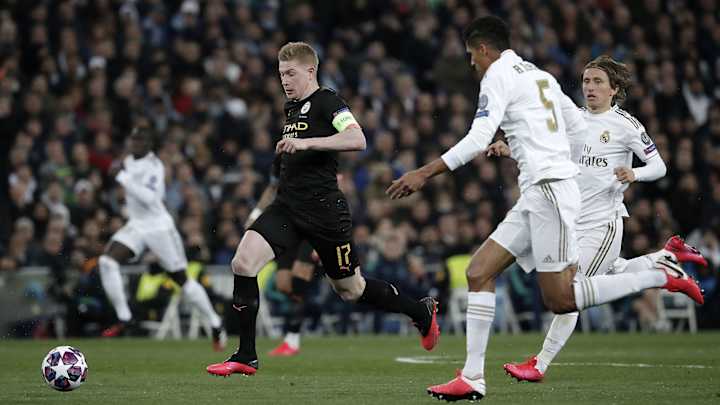The Champions League's Temporary New Look and the Clubs Impacted the Most

It didn’t take long after UEFA announced the format for concluding this season’s Champions League for the first problems to emerge. On Wednesday, UEFA president Aleksander Ceferin had confirmed that the quarterfinals onwards will be played over a period from Aug. 12-23 in Lisbon, Portugal. Less than 24 hours later, Timo Werner had confirmed that he will have left RB Leipzig by then to begin his new contract at Chelsea.
Nothing in this is straightforward. UEFA's solution is probably the most sensible it could have come up with to salvage the competition. With domestic leagues struggling to reach a conclusion, it couldn’t realistically have imposed additional games into their crowded calendars but had to wait until those seasons had come to an end. There was a clear need to minimize travel, so playing those final rounds over one leg at a neutral venue was the easiest and most efficient answer.
With Turkey still registering around 1,400 new cases of coronavirus per day (although its death rate is remarkably low), Istanbul, the original host for the 2020 final, could not be considered a safe venue. Portugal is running at under 300 new cases per day and has been at under 10 deaths per day for 10 days. It has, seemingly, been quite effective in its handling of the crisis, and in Lisbon it has two stadiums that have hosted major European finals within the last 15 years. It is an entirely reasonable choice. Equally, allowing Istanbul to host next year’s final and pushing the schedule back a year so St. Petersburg hosts in 2022, Munich in 2023 and London in 2024 is an entirely rational response.
But the problem is that for some countries there will be only three weeks between the Champions League final on Aug. 23 and the start of the 2020-21 season. Clubs signing players, understandably, want them rested and prepared for when the slog begins again. When Chelsea is paying $60 million for Werner which would have looked a bargain six months ago but, given the uncertainty in the market, may turn out to be a fortune–it doesn’t want him wearing himself out and potentially getting injured in Lisbon when he could be working at Cobham on fostering an understanding with the likes of Hakim Ziyech and Tammy Abraham.
That, clearly, is very bad news for RB Leipzig, which will be denied a player who has scored 28 domestic goals this season and another four in European competition. It’s also bad for the Champions League, both in terms of spectacle and integrity. Tottenham can look at whomever Leipzig plays in the quarterfinal and reason that it is not the same Leipzig by which it was ousted in the last 16. Another first-time quarterfinalist, Atalanta, is similarly in danger of losing key players before the games begin in Portugal.
There’s also the matter of the outstanding last-16 ties. Still-reigning-Bundesliga-champion Bayern Munich, 3-0 up from the first leg at Stamford Bridge, will presumably finish the job against Chelsea, but Napoli was scheduled to go to Barcelona level at 1-1, Juventus trailed Lyon 1-0 after the first leg in France, and Manchester City led Real Madrid 2-1 after the away leg in Spain. Their second legs will be played on Aug. 7 and 8, although it’s yet to be decided whether they will be played where they should have been originally or at neutral venues.
Given Lyon has Memphis Depay back from injury, while Cristiano Ronaldo has been in rotten form so far for Juventus in its two Coppa Italia games since restarting, Rudi Garcia’s side may think it has gotten lucky. Then again, given the French league has been abandoned, neither Lyon nor Paris Saint-Germain will have played any competitive football before the Champions League starts up again. That may leave them rusty, having been out of action for five months; however, on the other hand, some other clubs will have just come through a rigorous slate of two games a week for two months.
Bayern, having wrapped up the league on Tuesday, has only one match of any note before the Champions League resumes, the German Cup final vs. Bayer Leverkusen on July 4, so it, too, may find itself underprepared. Manchester City, whose league campaign is of almost no consequence now, may oddly find itself in the best position in terms of preparation with potentially three FA Cup ties still to play, plus a regular diet of league games to keep players in shape.
Of the sides still in the tournament, Napoli is probably the hardest hit in terms of the removal of home advantage, although Juventus has lost only two home league games over the past two seasons. There will be none of that sense of going to a difficult away ground and eking out a result before the second leg that still makes European football feel different and special.
But for all the flaws and issues, it’s hard to see how UEFA could have done anything differently. It may not be the same challenge as usual, but the Champions League remains club football’s ultimate prize.

An accomplished author of multiple books, Jonathan Wilson is one of the world’s preeminent minds on soccer tactics and history.